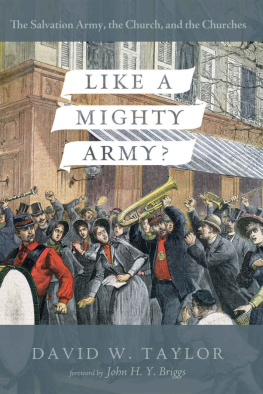PREFACE.
I use the word "Social" in the title of this work to suggest that, save in an auxiliary way, I am not attempting to describe the religious features of the organization. Such a field of investigation would prove a very profitable and interesting one, but it is a field, which, for the sake of clearness and impartial study, should be kept separate. The organization itself recognizes the primary division. Commander Booth-Tucker, the leader of the Army in the United States from 1896 to 1904, says, "The Salvation Army is the evolution of two great ideas: first, that of reaching with the gospel of salvation the masses who are outside the pale of ordinary church influence, and second, that of caring for their temporal as well as spiritual interests."
I have secured very little data from books, as there is but little authentic literature on the subject. Primarily, the data for this treatise were taken from personal observation. In pursuing the subject I have visited Salvation Army social institutions of every description. In addition to visiting the larger cities of the United States and the three Army colonies, situated in Ohio, Colorado and California, respectively, I have investigated the work in London, where the Army had its origin, and at the farm colony in Hadleigh, on the river Thames, some thirty miles from London. I have slept in the hotels, worked in the industrial homes, wandered over the farm colonies, and mingled with the inmates of other types of Army institutions.
Nov., 1909. E. G. L.
FOOTNOTES:
Pamphlet "The Salvation Army in the United States."
CHAPTER I.
Introduction.
The Salvation Army was founded by William Booth in London, England, in 1865. Previous to this time Mr. Booth had been a successful clergyman in the Methodist Church, and had become widely known throughout England as a revivalist. As time passed, he had become more and more interested in the condition of the un-churched masses, and as his church did not approve of his taking up work among the masses in connection with it as an organization, he had, in 1861, separated from the Methodists. With little support, he established in London what was known as The Christian Mission.
From the first, numbers of converts were made, and soon several missions were established in London, and other cities of England. From the first, too, the agency of women was an important feature. Especially was this true in visitation among the lower classes. In regard to the foundation of the Army itself and in connection with its earlier successes, much credit must be given to Mrs. Booth, the wife of William Booth. She became as noted a speaker and revivalist as her husband, and together, they made plans for the movement. Unfortunately she died of cancer in 1890. Through these early years of the movement its management, almost unconsciously, developed along lines that were military in form. At first the title of "Captain" was used among the sailors and fishermen to designate the local leader of the company, and then it was extended wherever, among the rough element, the "Mr." or "Rev." would seem out of place. The usage and the spirit accompanying it soon spread, and by the year 1879 military methods and titles were officially added. The Rev. Wm. Booth, who, up to this time, had been known as "Superintendent of the Christian Mission," became "General" Booth, and the "Mission" became the "Salvation Army."
This addition of military methods seems to have accelerated the movement by favoring efficient and systematic control. Soon after this time, we find, the organization had spread to the United States, Canada, Australia, France, Switzerland, Holland, Belgium, Scandinavia, Germany and Italy. Then missionary work was taken up in India, and later on, in Africa, Java and Japan. At the present time (1908), according to its reports, the Army occupies fifty-two different countries and colonies. In no country has its rate of progress been more remarkable than in the United States, where in point of numbers, the local organization now ranks second only to that of Great Britain.
Along with the rapid growth went a differentiation almost as rapid and unique as the growth itself. In fact, both reacted on each other. The work was separated first into three main departments, viz.: Spiritual, Social and Trade. It will be necessary to make a brief statement of this differentiation in detail. In the Spiritual Department we have the extension of the original idea, that of converting the people. Corps, as the different religious groups were called, sprang up and multiplied until even the smaller towns were occupied. Converts were added by hundreds and thousands. Large numbers of the brightest and best of these converts were utilized in extending the work still further, and after undergoing a brief training, were sent out, some to aid the movement in the mother country, others to begin the work in different parts of Europe and in America, and still others as missionaries to all parts of the world. Meanwhile, the work in each local organization or Corps, became systematized, and the Corps were united into Sections or Divisions, the Divisions into larger districts called Provinces, and the Provinces into Commands, which for the most part controlled the territory of an entire country. Each of these divisions from the Corps to the Command, was delegated to an officer who had sole charge, and who was responsible to the officer above him. For example, the United States, at present, is divided into two Commands; the first extending from New York to Chicago; the second from Chicago to the Pacific Coast. The first Command has six Provinces; the second, four. Each Province has from three to nine Divisions, and each Division contains a number of Corps. Thus, while each Corps is complete in itself, the general administration is very highly centralized; so much so, that an order from General Booth at the National Headquarters, London, England, must be obeyed by every Corps in the world.
While the organization of the Spiritual Department was taking place in this manner, the Social Work was assuming large proportions, and differentiating itself. Visitation in the lower parts of the cities was organized into a regular department of Slum Work, called the Slum Department, with a specialized corps of officers. Work among fallen women was instituted as the Rescue Department, with its rescue homes and trained workers. The establishment of hotels and lunch counters for both men and women became finally what is now the Social Department. The wood yards and small factories, together with the salvage depots and cheap stores, were organized into the Industrial Department. Work among the children resulted in the establishment of kindergartens and orphanages. The colonization enterprise took root, and was divided into the industrial colonies and farm colonies. Thus, we have here a differentiation of the original Social Department into six distinct divisions, which we shall consider separately in this treatise. As these lines of work advanced, although each had its special group of workers, it was natural that the work should follow the administrative system of Commands, Provinces, Divisions and Corps, which had already been marked out in the Spiritual Department.













